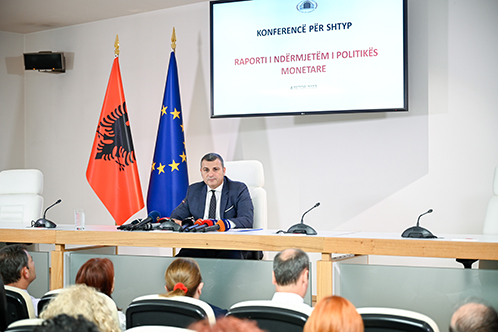BANK OF ALBANIA
PRESS RELEASE
Governor Sejko: Statement to the Press Conference on Monetary Policy Decision
Publication date: 04.10.2023
Dear ladies and gentlemen,
Today, on 4 October 2023, the Supervisory Council of the Bank of Albania reviewed and approved the Intermediate Monetary Policy Report.
The new information analysed in this Report has resulted, overall, in line with the expectations of the Bank of Albania. Economic activity has continued to grow in the second and third quarters of the year, while inflation has been coming down.

The Supervisory Council assesses that the prudent normalisation of monetary policy stance has contributed positively to the declining trend of inflation and to safeguard the macroeconomic balances in Albania.
Projections for the future remain positive. The Albanian economy, despite accelerating temporary, is expected to continue to grow in the future, while inflation is expected to return to the target by mid-2024. Against this backdrop, the Supervisory Council deems that the current monetary policy stance remains adequate.
***
Inflation continued to decline in the third quarter of year, to 4.2% and 4% in July and August, respectively. The fall in inflation has been at a relatively broad base across various items of consumer basket. Nevertheless, the declining pace has slowed down in the third quarter, while price inflation of services, rent and durable goods showed overall stable, by exhibiting both the high demand and the increased production costs in Albania.

From the macroeconomic perspective, inflation declined on the back of the reduced imported inflation, while domestic inflationary pressures - though trending downwards - appear more stable. In a more detailed view, the reduced imported inflation reflected the stability of prices in international markets and the appreciation of lek exchange rate in the last years. By contrast, the fast growth in wages and production costs has dictated the stability in the domestic inflationary pressures.
We deem that, the stabilisation of imported inflation at low rates, a more balanced performance of demand and supply for goods in Albania, as well as the gradual convergence of inflation’s expectations to the target, will lead to the further reduction in inflation over the next quarters.
According to INSTAT data, the Albanian economy continued to grow in the first half of 2023. The economic growth pace improved slightly in the second quarter, reaching to 3.2%. Indirect available data suggests a similar growth momentum in the third quarter as well.
Economic growth has reflected the expanded activity in construction sector and in certain branches of services, while the sectors of agriculture and industry have declined. This performance has been driven by the expanded domestic demand for goods and services, owing to the increased household consumption and investments in private sector, coupled with the growth in the export of services. On the other hand, fiscal policy has remained on the consolidating side, while the export of goods has been decreasing.
The positive cyclical position of the Albanian economy reflects the relatively fast surge in the demand for goods and services in the last three years. This position has driven to the improved financial position of the Albanian businesses, mainly in services industry, and - in view of the shortages noted in the labour market – it has been reflected in a fast wage growth in the private sector. In particular, employment recorded an annual growth rate of 2.7% in the second quarter of 2023, while average wage in the private sector expanded by 15%, by driving up the Albanian households’ income, but keeping both the production costs and the domestic inflationary pressures still high.
From the macroeconomic perspective, the still favourable financing conditions in Albania, the gradual improved business and consumer's confidence in 2023, and the fast boost in tourism sector continue to fuel the expansion in the demand for goods and services.
Albanian financial markets have been relatively calm in the previous quarter. In particular, lek exchange rate fluctuations against the euro, have been reducing, while the lek/euro exchange rate appears to have been stabilised around the current levels.
The gradual normalisation of monetary policy stance has driven to an overall hike in interest rates in Albania. Nevertheless, the domestic financial conditions still remain simulating. In addition, financing costs of private and public sectors reflect the contained risk premia of liquidity and credit, by suggesting a relatively calm financial environment and the overall positive perception of banking sector about the next economic developments. The credit growth pace to private sector has slowed down in the last quarters, in reflection of the reduced needs of businesses for working capital and a more prudent policy of banking sector towards lending.
On the other hand, the lek exchange rate, after the rapid appreciation in the period May-July, has been stabilised in August and September, settling on a new equilibrium around the current levels. This performance suggests that, while the improvement in the external balance sheets of the Albanian economy drives to an appreciation of lek in short and medium term periods, the foreign exchange market has been and remains subject to short-term fluctuations. For this reason, all operators in the foreign exchange market must be cautious in carrying out their business, by avoiding taking unnecessary exposures to the exchange rate risk.
The updating of forecasts does not change our expectations for the future.
Projections in the baseline scenario suggest that the Albanian economy will continue to grow over the coming period, while inflation will return to the target by mid- 2024. In the short run, a more moderate pace of economic growth is expected to lead to a more balanced performance of demand and supply for goods and services, helping to reduce domestic inflationary pressures and stabilize prices in the next year. In the medium term, the economic growth pace is expected to further normalize, in line with the country's production potentials.
This forecast scenario factors our expectations for a slow, but still positive performance of the euro area economy, the expectations for a gradual reduction of inflation in the external environment, as well as the expectations for a smooth performance of both the Albanian economy and financial markets.
At the same time, the updated analysis and forecasts suggest a more neutral balance of risk profile.
***
Judging on the above, the Supervisory Council decided to:
- Keep the policy rate unchanged, at 3.00%;
- Keep the overnight lending rate unchanged, at 4.00%;
- Keep the overnight deposit rate unchanged, at 2.00%.
The Supervisory Council notes that this decision enables the creation of adequate condition for inflation returns to the target in the next year. In addition, this decision is consistent with the consolidating, current and expected fiscal policy direction and the appreciating trend that the exchange rate has followed during 2023.
However, the Supervisory Council deems that the elevated inflationary pressures from the domestic economy remain a risk factor to price stability in Albania. In this view, it highlights the willingness to continue the normalisation process of monetary policy stance, if this measure will be considered necessary for guaranteeing price stability.

 Linkedin
Linkedin
 Twitter
Twitter
 Youtube
Youtube
 Facebook
Facebook
 Flickr
Flickr
 RSS
RSS
 Subscribe
Subscribe
 Feedback
Feedback